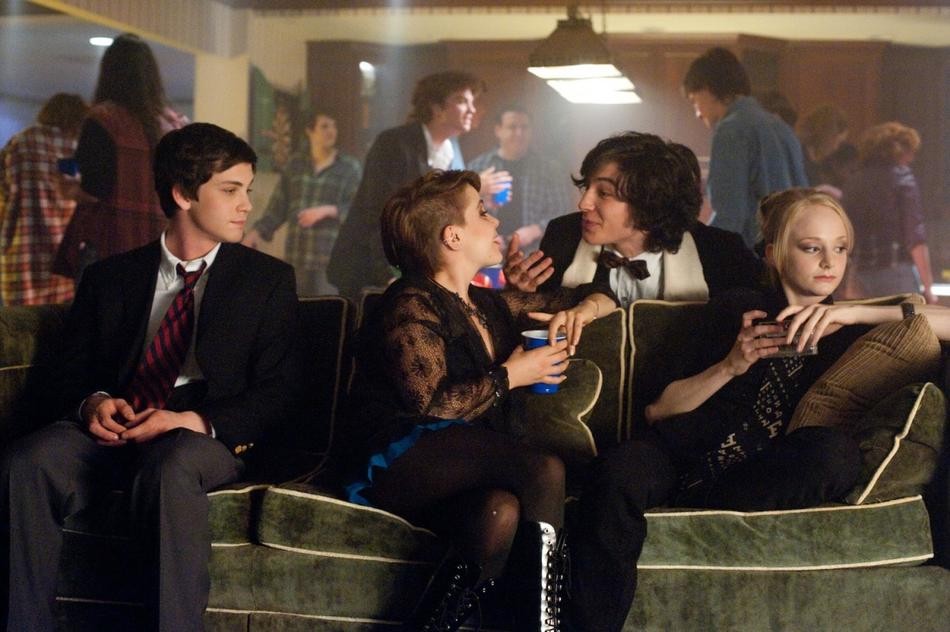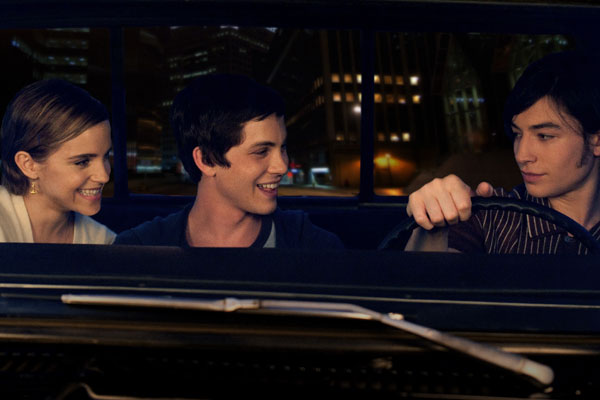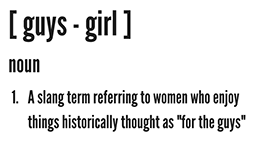SEE The Perks of Being A Wallflower, the marvelous coming of age story about misfit high school friends set in the 1980s, from writer/director Stephen Chbosky. With great performances highlighting a superior script, this film is a cut-above almost all others in the genre.
Hit the title/continue reading to read more. . .
image source
The Perks Of Being A Wallflower is told from the point of view of Charlie (Logan Lerman), a troubled teen entering his first year of high school. We see his initial isolation upon his arrival, and he alerts in voice over how all of the potential connections he might have had with various cliques seem to carry no weight under the glare of the teenage microscope. Eventually, though he finds a crowd to hang with. There is flamboyant, gay Patrick (Ezra Miller), his damaged but resilient stepsister Sam (Emma Watson), on whom Charlie develops a crush, and their group of friends, including Mary Elizabeth (Mae Whitman), who becomes Charlie’s first girlfriend.
This film relies on its three leads to carry the story, and Lerman, Miller and Watson come through in a huge way. Emma Watson has a luminous movie-star quality that is nearly unmatched (only Anne Hathaway comes to mind) and Chbosky makes great visual use of her in the film. In an early scene, Watson is standing in the back of a pickup truck, going through a tunnel, arms outstretched, eyes closed, wind blowing through her hair. It is the moment Charlie really falls in love with her, and the audience does as well. She is radiant. Logan Lerman is excellent as Charlie, whose story is more uneven than the other characters’, and we learn substantial portions of Charlie’s story in flashback (with a little too much coming right at the end). Lerman is undeterred by this, giving Charlie a conflicted but amiable quality – the ticking time bomb with a happy face drawn on the side. The best performance in this film, however, belongs to Miller, who creates a character so believable and so damn REAL I swear he could have been based on a guy I went to high school with.
Dream Team: Watson, Lerman & Miller
image source
.
This picture has been called an instant classic and has been compared to The Breakfast Club. While I agree it is excellent, and possibly the best film of its type SINCE The Breakfast Club, I will stop short of calling it an instant classic. As I indicated, too much of Charlie’s backstory comes in a rush at the end of the film, and for a picture which told its story with such steady and even pacing, the ending feels like a door slamming in your face. That’s one of my few complaints however. The performances are terrific, and all of the characters are beautifully written. The ‘80s vibe of the film is saturating without being omnipresent, and the tone is once again perfect, especially in scenes like the gang going to a Rocky Horror screening in full costume.
The Perks of Being A Wallflower was very clearly a labor of love for Stephen Chbosky, who spent five years writing the book and another decade getting it to the screen. I’ll be interested in seeing if he can craft something else just as compelling with a much shorter turnaround time.
ALSO ON DVD:
YOUR CALL on Flight. For the first 25 minutes of this picture, as it builds to the crescendo of a harrowing planecrash, the film is riveting, but it falls off after that and moves forward in fits and starts afterwards. There is great leading performance here from Denzel Washington as an unimaginably damaged pilot, and some strong supporting performances from the likes of Tamara Tunie, Bruce Greenwood & John Goodman, but this picture has a tendency to get a little chatty and it squanders away long segments of screen time speechifying at the audience. The run time goes too long as a result, and the film talks a lot to say only a little.
SEE Bully, the moving and powerful documentary about the victims of bullying in schools and their parents’ often frustrated efforts to get schools to take action to prevent it. Writer/director Lee Hirsch does no editorializing here. His camera is simply present and we watch his subjects talk about their lives, sometimes with tragic endings. It is a tribute to the flimmaker that he never once needs to tell us how we should feel or what should be done – it is all too clear just from watching.







